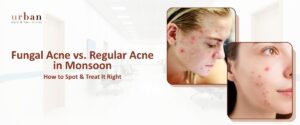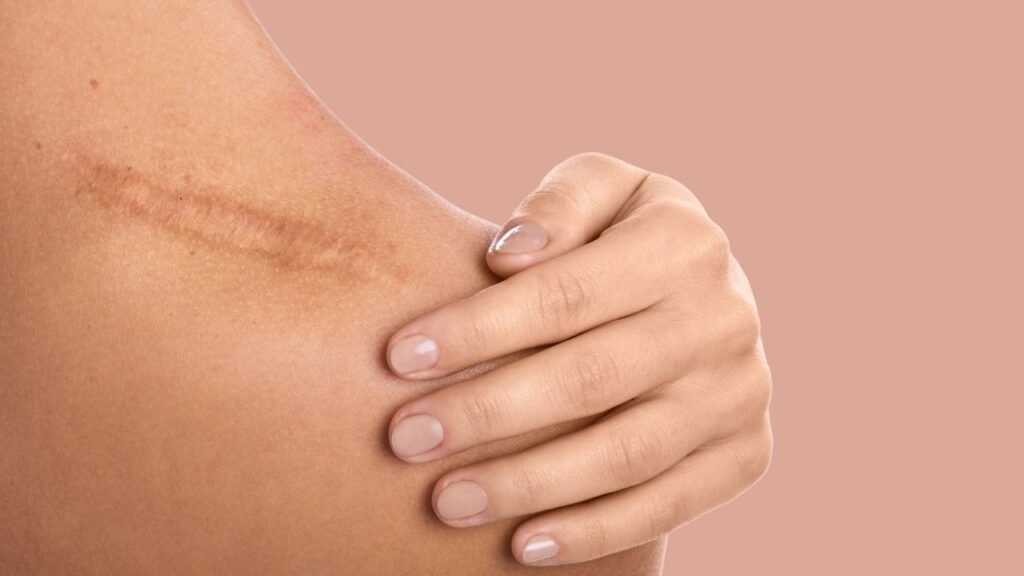How to Remove Fungal Infection Marks From the Skin?

Table of Contents
A skin disease caused by fungus is known as mycosis or fungal infection. There are many species of fungus but only around 300 react on the skin to cause an infection. Some of the common fungal skin infections are mucous membrane, oral thrush, and vaginal yeast infection.
Skin infections can be irritating. It is crucial to get treatment at the right time to stop the spread of the same. Let’s learn more about skin fungal infection and you can remove it.
Call Our Specialist
What is a fungal infection?
Fungi are constantly present on the surface of your skin. However, sometimes they multiply rapidly or infiltrate your skin through a wound. They cause infections in areas that sweat, like the feet or groin. Usually, it causes a rash or discoloration on the skin, most of which are itchy.
Fungal infections are widespread. The fungi adhere to clothes, people, or pets. This infection makes you highly uncomfortable but it does not cause any serious issues.
Following are some of the common fungal infections:
- Ringworm
Ringworm occurs on the feet (Athlete’s foot), groin or thighs (jock itch), or scalp. It appears as ring-like reddish rashes. Moreover, it is usually itchy and very contagious.
- Tinea Versicolor
It affects the chest, back, or upper arms. It appears as little oval discolored patches on the skin. It is caused by a fungus called Malassezia.
- Cutaneous candidiasis
This infection affects damp areas like below the breasts and buttocks. The fungus candida causes it. They appear as small reddish bumps which are itchy.
- Onychomycosis
This infection primarily affects your toe or fingernails. They appear as brittle and discolored nails. They most often attack the toes.
Causes of fungal infection
Many factors increase the risk of getting a fungal skin infection. You are more prone to a fungal infection if you:
- Sweat a lot
- Do not cleanse and dry your skin regularly
- Stay in a damp or humid environment
- Use shared clothing or bedding
- Wear poorly ventilated clothes
- Touch or live with animals that have a fungal infection
- Have a weak immune system because of medical ailments, like HIV
How long does it take for a fungal skin infection to clear up?
If given the right treatment, a superficial or mild fungal infection heals in a few days or a couple of months. However, deep tissue or severe fungal infection can take a couple of years to heal completely.
But in people with a weak immune system, the fungal infection does not cure easily, even with proper treatment. It might never be complete throughout their life. Hence, it is important to take precautionary measures for fungal infections.
Chronic yeast infections often take longer to cure than others. Sometimes, they reappear within months. Therefore, it is advisable to consult your doctor in such cases and take proper medication. Yeast infections are often prescribed the same drugs. However, the doctor may prescribe higher doses to avoid reinfection.
Treatment of fungal infection
Different fungal infections have different treatments. Here are some:
- Athlete’s foot
Athletes’ feet may be treated with various over-the-counter (OTC) antifungal topical medicines. Your doctor may prescribe something stronger if they don’t work.
- Jock itch
Jock itch is often treatable at home using antifungal cream, powder, or spray over-the-counter (OTC). Consult your physician if your symptoms do not improve after two weeks of self-care. They have access to more potent antifungal drugs.
- Ringworm
Ringworm may frequently be treated with over-the-counter antifungal creams, sprays, gels, or ointments, like jock itch and athlete’s foot. If your condition is severe or the infection has spread to your nails or scalp, you may need a prescription.
- Yeast infection
There are many treatment choices for a yeast infection, and the one you get will be determined by the kind and frequency of your yeast infections. Oral antifungal medicines like Lozenges, tablets, or mouthwash may treat thrush.
If you detect early enough, it’s possible to cure a vaginal yeast infection using over-the-counter (OTC) medications. Your doctor may also give antifungal medicines in the form of cream, tablet, or vaginal suppository without a natural cure for the infection.
Probiotics, such as Lactobacillus acidophilus, may be prescribed by your doctor. Probiotics are supplements that contain beneficial bacteria that may aid in microbial balance restoration in the body.
- Toenail fungus
Toenail infections may take months to cure, whereas fingernail infections might take weeks. The majority of over-the-counter (OTC) medicines are ineffective. A nail lacquer that you brush on, like nail paint, or an antibiotic you take orally, may be prescribed by your doctor. Because this illness is so difficult to cure, it’s critical to keep it from spreading.
The right way to treat fungal infections is using antifungal medicines. They help in eradicating the fungi or preventing them from multiplying.
These medications are available in various forms such as ointments, sprays, powder, shampoos, and tablets. Doctors usually prescribe different medicines for different types of fungi. However, you can take a few precautions at home, like:
- Keep your surroundings dry and clean. Wear breathable clothing and change all your clothing frequently.
- Avoid walking barefoot.
- Use antibacterial or antifungal soap and wash yourself every day.
Most fungal infections heal without leaving any scars; However, in some cases, ringworm infections leave rash scars. These scars appear as discoloration, traces of rashes, or marks on the skin. Not all of them are permanent and fade over time. But you can take a few steps to minimize the scars like:
- Dermabrasion
- Laser treatment
- Application of Vitamin E oil or cream
- Protecting skin from further damage
- Consult a doctor for more techniques
Conclusion
In most cases, over-the-counter or prescription treatments effectively treat a fungal skin infection. However, more severe infections may need the use of additional treatments. Preventive measures may also help reduce the risk of contracting a fungal skin infection.
If you have any signs of infection, contact your doctor to prevent any complications. For treating fungal skin infections, contacting our specialist may be of help. We have top-notch facilities and knowledgeable staff that have expertise in treating severe fungal infections.













